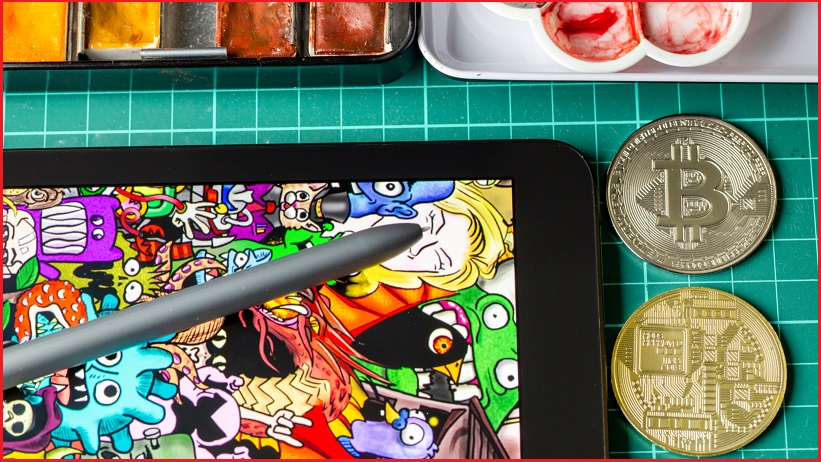Non-fungible tokens (NFTs) are rapidly becoming big business – but as companies of all stripes jump on the bandwagon, the fledgling market faces a serious skills shortage that may take years to fill.
Corporate investment in NFTs – images, videos or documents that use a blockchain-based ‘certificate of authenticity’ to attest to their provenance – has exploded in recent months as major brands, particularly sporting brands, follow in the steps of early pioneer the US NBA.
It’s all part of the new dynamics of a market for digital collectibles that is expected to surpass $40b ($US30b) this year on the back of commitments from major racing brands like Alfa Romeo, Red Bull and McLaren, which are exploring the use of NFTs to support their Formula 1 racing activities.
Car maker Honda debuted its latest Acura Integra as a limited-edition metaverse NFT, while racing drivers Pietro and Enzo Fittipaldi recently launched an NFT collection to raise money for Ukraine refugees.
Other sports are following suit, with Cricket Australia recently signing a multi-year licensing deal that will see NFTs of still photographs, official broadcast video and commentary released in partnership with Singapore collectibles platform Rario and NFT trading company BlockTrust.
Players are expected to take a cut from sale of the NFTs, which Cricket Australia CEO Nick Hockley said “will open up huge opportunities for innovation and fan engagement…. I have no doubt we will see enormous benefit for fans, players and the sport itself as we build this exciting partnership.”
NFTs are “a golden money-making opportunity for the sports industry and a great way for sports fans to engage with their favourite teams, athletes and historical moments,” said James Green, group investment director with global financial advisory deVere Group, which recently launched a series of sports NFTs on its dV Gems NFT platform.
“People have always loved to own sports collectibles.”
Solid investment or a new Ponzi scheme?
Building the platforms to seamlessly market and manage NFTs has become big business – and sent innovators racing for the skills they require.
One recent analysis of 351,000 contractor job postings found NFT-related demand increased by 37 per cent – to 2,814 jobs – during the first quarter of this year, with a similar surge for caricature and cartoon-related roles, which grew 19 per cent to 3,205 positions.
Related skills were also in demand, with blockchain – up 109 per cent to 4,816 jobs – and Ethereum – up 31 per cent to 1,780 jobs – recording solid growth in demand.
At the same time, Bitcoin-related job demand slumped by 31 per cent, to just 1,045 jobs.
Those figures were a contrast to recent GlobalData analysis that found 615 active NFT-related job roles in the market during the last quarter – suggesting that many companies seeking NFT skills are startups moving to secure them quickly from contractors.
Many established brands, by contrast, seem to be looking for longer-term commitments with full job postings.
“Recent job postings from Nike, Microsoft, StockX, and Intuit require applicants to have working knowledge of NFTs,” said GlobalData Thematic Research team analyst Amrit Dhami, who noted that “companies such as these are interested in hiring individuals that have experience using web3.0 and NFT platforms.”
Demand is certain to surge further next month, when Meta is expected to pilot-test a NFT market that will enable NFT trading across Facebook and Instagram.
“It’s not yet clear what this will entail,” Dhami noted, but “for businesses more widely, it would likely make NFTs a more mainstream, credible, and desirable concept.”
With no less than the UK Royal Mint developing digital tokens, bullish financial advisors believe NFTs will become a standard part of investment portfolios within the next five years – with a recent DeVere Group poll finding 74 per cent of generation Z respondents want NFTs integrated into their investment portfolios.
Yet many early investors are already getting burned – as did the Malaysian blockchain investor who bought Twitter co-founder Jack Dorsey’s first-ever tweet for around $4m and is now struggling to get $400 for it.
NFTs have also spawned a cottage industry for fraudsters, with criminals exploiting platforms to mint counterfeit digital assets – with one scammer selling a fake Banksy NFT for $467,000 and another stealing $750,000 in an Elon Musk-related NFT scam.
Echoing the repeated compromises of Bitcoin exchanges, often hastily-built NFT marketplaces are already facing imminent compromise, with security firm Check Point warning this month that vulnerabilities in the Rarible NFT marketplace could have left users’ cryptocurrency wallets and NFTs vulnerable – just months after a similar similar issue with NFT marketplace OpenSea.
Building a pipeline of blockchain and NFT skills will be crucial to building a robust, resilient and secure ecosystem – and educational institutions are finally pivoting to help, with TAFE Queensland recently partnering with Blockchain Collective to launch a formal Diploma of Applied Blockchain.
“The demand for knowledge and education about blockchain technology is growing exponentially around the world,” said Karen Dickinson, TAFE Queensland general manager on the Gold Coast, who believes the project-based course will prove foundational for an industry that will require the full gamut of technical and business skills.
“While software engineers and IT experts are needed to implement and support blockchain applications,” she said – citing the importance of blockchain project managers to manage the entire lifecycle of a blockchain project – “non-tech people are also needed to handle business operations that are vital to the overall blockchain project.”










